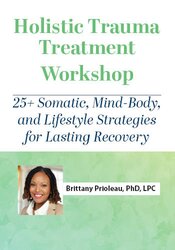

When I first began my work as a therapist, I leaned heavily on traditional talk therapy – holding space, helping clients process their stories. It was meaningful work. But I found myself asking: What’s missing?
The answer became clear – trauma doesn’t just live in our thoughts. It lives in the body. In the nervous system. In our relationships. In our daily habits. In our support systems – lack thereof, often shaped by culture, history, and systemic factors.
Once I started addressing trauma in the body through nutrition, lifestyle, and social connection – with attention to each client’s cultural context – everything changed. Clients weren’t just gaining insight; they were experiencing real, lasting transformation. They were feeling at home in themselves again, sleeping better, connecting more deeply.
And I’ve been practicing that way ever since.
That shift inspired me to create the Holistic Trauma Treatment Workshop – a comprehensive, online training that gives you the tools to support your clients in healing trauma at every level: physical, emotional, mental, relational, and cultural.
In this course, I’ll guide you through:
If you’re ready to expand your impact, deepen your healing toolkit, and work in a way that honors the whole person – body, mind, and spirit – I invite you to join me.
With gratitude,
Dr. Brittany Prioleau, LPC
Planning Committee Disclosure - No relevant relationships
All members of the С�����Ƶ. planning committee have provided disclosures of financial relationships with ineligible organizations and any relevant non-financial relationships prior to planning content for this activity. None of the committee members had relevant financial relationships with ineligible companies or other potentially biasing relationships to disclose to learners. For speaker disclosures, please see the faculty biography.
Continuing education credit information is coming soon for this non-interactive self-study package.
CE hours may be available for select professions, as listed in the target audience. Hours will be dependent on the actual recording time. Please check with your state licensing board or organization for specific requirements.
There may be an additional fee for CE certificates. Please contact our Customer Service at 1-800-844-8260 for more details.
**Materials that are included in this course may include interventions and modalities that are beyond the authorized practice of your profession. As a licensed professional, you are responsible for reviewing the scope of practice, including activities that are defined in law as beyond the boundaries of practice in accordance with and in compliance with your professions standards.

Brittany Prioleau, PhD, LPC, LCMHC, ACS, NCC, CMHIMP, is a trauma-informed therapist, educator, and integrative wellness specialist with a passion for whole-person healing. As an assistant professor in the counseling department at Mercer University (Atlanta campus) and founder of Cultivate & Bloom Wellness, she blends clinical expertise with a deep commitment to accessible, culturally responsive care.
With clinical experience across the lifespan – from children to adults, in both school and community settings – Dr. Prioleau specializes in supporting historically underserved populations through somatic, lifestyle-based, and mind-body interventions.
Her research focuses on race-related stress, trauma-informed wellness in urban schools, and multicultural approaches to integrative counseling.
She also brings advanced training in psychedelic-assisted therapy, offering innovative perspectives on healing beyond talk therapy. Whether in the classroom or the therapy room, she equips professionals with the tools to serve clients holistically – body, mind, and spirit.
Speaker Disclosures:
Financial: Brittany Prioleau has employment relationships with Mercer University, the University of North Carolina Charlotte, Mu Upsilon Alpha, Cultivate & Bloom Wellness LLC. She receives a speaking honorarium from С�����Ƶ. She has no relevant financial relationships with ineligible organizations.
Non-financial: Brittany Prioleau is a member of the American Counseling Association, the Association of Counselor Education and Supervision, the Association of Multicultural Counseling and Development, and the North Carolina Counseling Association.
Access never expires for this product.
Visit our FAQ page at www.pesi.com/faq or contact us at www.pesi.com/info
Foundations of Holistic, Trauma-Informed Care
The full impact of trauma: biological, psychological, and behavioral effects
Somatic & Nervous System Regulation Strategies (10+ tools)
Lifestyle Interventions for Trauma Recovery (10+ tools)
Create Personalized, Trauma-Informed Wellness Plans
Self-Care for Clinicians
Ethics, Scope and Clinical Judgment
Satisfaction Guarantee
Your satisfaction is our goal and our guarantee. Concerns should be addressed to: PO Box 1000, Eau Claire, WI 54702-1000 or call 1-800-844-8260.
ADA Needs
We would be happy to accommodate your ADA needs; please call our Customer Service Department for more information at 1-800-844-8260.
С�����Ƶ Mobile App
Access CE trainings on your phone or tablet through our free mobile app. Choose video or audio-only versions of online courses from the world’s best instructors, and complete your CE requirements anywhere, anytime, at your own pace.
Please wait ...